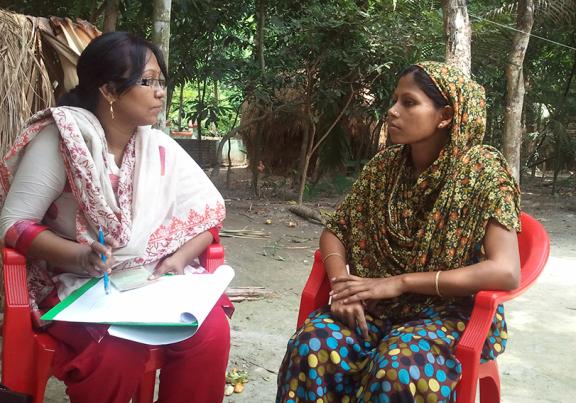Resource
Assessing the Performance of National Sentinel Food Lists at Subnational Levels in Six Countries (Journal Article)
This paper assesses how well national sentinel lists of the most frequently consumed foods in each food group capture data at subnational levels to measure minimum diet diversity (MDD). It found that national sentinel food lists can provide reliable data at subnational levels for most food groups, with some variability by country and sub-region. Assessing the accuracy of national sentinel food lists, especially for fruits and vegetables, before using them at the subnational level could avoid potentially underestimating dietary diversity and provide more accurate local information for programmes, policy and research.
Resource
Food Environment Monitoring and Evaluation: Guidance and Tools
Resource
Multiple Pass 24-Hour Recall for Measuring Children’s Diets: What Subsequent Passes Add in a Standard 24-Hour Recall
Resource
M&E Online Course Repository (Resource Collection)
USAID Mission and project staff can use this repository to search for monitoring, evaluation, and learning courses that meet their specific needs.
Resource
Measuring What it Takes to Provide Care (Resource Collection)
This toolkit helps program teams identify and track measures of intangible resources that caregivers need to provide nurturing care for young children. It also offers guidance to build a comprehensive program theory of change or monitoring and evaluation plan.
Resource
Diet Assessment Decision Tool (Resource Collection)
Dietary patterns and nutrient intake are key pieces of information when planning and monitoring nutrition programming. This tool provides existing data sources and data collection tools to help users understand dietary patterns and nutrient intake for evidence-based decision making as part of program design and monitoring.
Resource
Adolescent Nutrition Resource Bank (Resource Collection)
Adolescent nutrition is an important but often overlooked part of activity design. This collection offers a wide range of technical resources to support various stages of the program cycle, including monitoring and evaluation.
Resource
Tools for Designing and Conducting Social and Behavior Change Evaluations
These practical tools help practitioners and evaluators improve nutrition social and behavior change evaluations. It complements Measuring Social and Behavior Change in Nutrition Programs: A Guide for Evaluators and Evaluating Social and Behavior Change Components of Nutrition Activities: A Design Guide for USAID Staff.
Diet Assessment Tool
Diet Quality Questionnaire (DQ-Q)
This guide helps practitioners gather food group consumption data using a standardized, easy-to-use tool that takes five minutes to administer. Consumption data can be assessed at national and global levels.
Resource
Evaluating Social and Behavior Change Components of Nutrition Activities: A Design Guide for USAID Staff
This guide supports USAID staff who are involved in planning an evaluation, identifying evaluation objectives, and building an evaluation scope of work for an activity that uses social and behavior change (SBC) to improve multi-sectoral nutrition outcomes. The guide explains the finer points of evaluating SBC approaches and includes links to helpful general evaluation guidance.
Resource
Measuring Social and Behavior Change in Nutrition Programs: A Guide for Evaluators
This guide supports partners conducting an evaluation of an activity that uses social and behavior change (SBC) to improve multi-sectoral nutrition outcomes. The document focuses on enhancing skills by incorporating the nuances of evaluating SBC approaches for improving nutrition outcomes. Links to helpful general evaluation guidance are incorporated for reference.
Resource
Beyond Stunting: Complementary Indicators for Monitoring and Evaluating USAID Nutrition Activities
This document introduces approaches and indicators for comprehensively and meaningfully measuring results of nutrition programs to support activity design.
Resource
Measuring and Monitoring Multi-Sectoral Nutrition Collaboration: Guidance and Considerations
This guidance enables Missions and partners to document and evaluate their collaboration at both the activity and portfolio levels and outlines five types of collaboration that align with specific collaboration goals: networking, cooperation, coordination, coalition, and integration.
Resource
Monitoring Social and Behavior Change for Multi-Sectoral Nutrition
These practical tools help practitioners and evaluators improve nutrition social and behavior change evaluations. It complements Measuring Social and Behavior Change in Nutrition Programs: A Guide for Evaluators and Evaluating Social and Behavior Change Components of Nutrition Activities: A Design Guide for USAID Staff.
Resource
Technical Brief on Costing Multi-Sectoral Nutrition Activities
This brief summarizes guidance for planning, tracking, and assessing costs of multi-sectoral nutrition activities. It highlights resources that USAID Missions and implementing partners may find useful for conceptualizing costing and presents resources with detailed guidance on key phases.
Resource
Engaging Family Members in Maternal, Infant and Young Child Nutrition Activities in Low‐ and Middle‐Income Countries: A Systematic Scoping Review
This systematic review describes program approaches designed to achieve nutrition social and behavior change by increasing family support.
Resource
Methods, Tools, and Metrics for Evaluating Market Food Environments in Low- and Middle-Income Countries
This report provides a priority list of methods, tools, and metrics for evaluating informal and formal market food environments in low- and middle -income countries.
